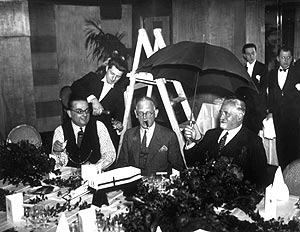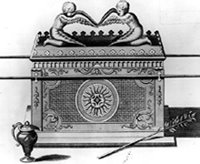Friday the 13th is unlucky, so are his roots
Do you suffer from paraskevidekatriaphobia?
This long-winded word is not a wind-up, but the psychological term for the morbid and irrational fear of Friday the 13th. This date has been regarded as the "devil's day" in Scotland and other cultures from the ancient Egyptians to Christians. But how has this happened and what are the reasons behind the day's demonic status?
The day Friday and the number 13 have been associated with bad luck for thousands of years, but it is only in recent history that the two have been amalgamated.
Dan Brown's ubiquitous novel, The Da Vinci Code, details the role the Church played in eradicating the power of the sacred feminine throughout ancient culture. According to Brown, they did this in an effort to homogenise the Christian faith into believing the dominant male, namely Jesus and God, were omnipotent.

Such a campaign to rid the ancient peoples of their belief in sacred feminine symbolism has links to the day Friday. In Muslim culture, Friday is regarded as a holy day, while in pagan Norse mythology, Friday is the only day in the week which celebrates a goddess, namely Frigg. Frigg is strongly associated with spring, birds and cats and was the goddess of the sea, marriage and fertility. With the spread of Christianity and the resulting dilution of the influence of alternative beliefs, Frigg was stigmatised as a witch, while her day moved from being a holy day to an unlucky one.
It will come as no surprise then, with the expansion of Christian scripture to eradicate the influence of pagan deities, that some interpretations give Friday as the day of Jesus's crucifixion, the great flood in which Noah prevailed, Solomon's temple fell and the day when Cain killed his brother Abel. It is also believed by some to be the day in the Bible when Eve gave Adam the forbidden apple, further demonising the feminine form.
The number 13 has also had negative connotations throughout the ages. According to Norse legend, 12 gods were invited to a banquet at Valhalla, the mythical hall of the glorious dead who were slain in battle. Loki, the evil god of mischief, crashed the party, bringing the total attendees to 13. He incited Hod, the blind god of winter to attack his brother Balder the Good, the favourite of the gods, with a spear of mistletoe, killing Balder instantly.

The ancient Norse people believed that having 13 people at a dinner party was bad luck and this myth was enhanced by the story of Jesus's death. The Last Supper was attended by Jesus and his Twelve Disciples. It was here that Jesus prophesised one among them would betray him to his death. In Leonardo Da Vinci's famous interpretation of the event, Judas Iscariot is the 13th person present.
Number 13 has now become embedded in popular culture as a sign of bad luck. In Edinburgh, the Bonham Hotel and the Malmaison are without rooms with number 13 on the door, while Glasgow Royal Infirmary is not so suspicious, with its outpatients using ward 13. But should we take any notice of this number?
The doomed space mission Apollo 13, made into a feature film with Tom Hanks, was launched on 13 April at 13:13 local time, while a recent interpretation of the number has brought another interesting, if unsettling point. Several serial killers have 13 letters in their names: Jack the Ripper, Charles Manson, Jeffrey Dahmer and Theodore (Ted) Bundy all have this honour. In a strange coincidence, so do the words Prime Minister.
So how did the two mix? Well, we can return to The Da Vinci Code and one of the periods of history it highlights.

The Knights Templar, the fighting monks who became rich and powerful during the Crusades to the Holy Land, were rumoured to have found biblical artefacts – possibly the Ark of the Covenant or the Holy Grail.
By the 1300s, the Knights were a political and cultural threat to Pope Clement V and King Philip IV of France, who was struggling with huge debts. After taxing of his own people to fill the void, Philip's attention turned to the rich Templars.
In a remarkable effort of organisation for the time, he coordinated the arrests of Jacques de Molay, the Grand Master of the Knights Templar, and thousands of other Knights across Europe, decimating the powerful group.
The day of this infamous event? Friday the 13th of October, 1307 - some 699 years ago.
When Philip raided the headquarters of the Knights, he found that the treasure had been moved. Some believe it was transported to La Rochelle two days previously and shipped by the Templars to Scotland.
Today in popular culture and symbolism, Friday the 13th is an unlucky day. With little evidence before the late 1800s of the day bringing distinct misfortune, some scholars have argued that it has been stigmatised by 20th century media-hype.
"Friday 13th is a comparatively recent phenomenon, dating back only to the early 20th century," says Lizanne Henderson, history lecturer at the University of Glasgow. "The first definite reference to the connection between Friday and the 13th occurred in the journal Notes and Queries (1913), which mentions 'the evil luck of Friday 13th'. After the film Friday the 13th in the 1980s, the connection was well-sealed in American and British popular culture."
So surely it is nonsense to think that Friday the 13th is unlike any other day. Or perhaps, the ghosts of the Knights Templar demonstrate that it is indeed the "devil's day". Maybe we should stay away from ladders, throw salt over our shoulders and try to persuade a black cat to walk in front of us. Just in case.


0 Comments:
Post a Comment
Subscribe to Post Comments [Atom]
<< Home